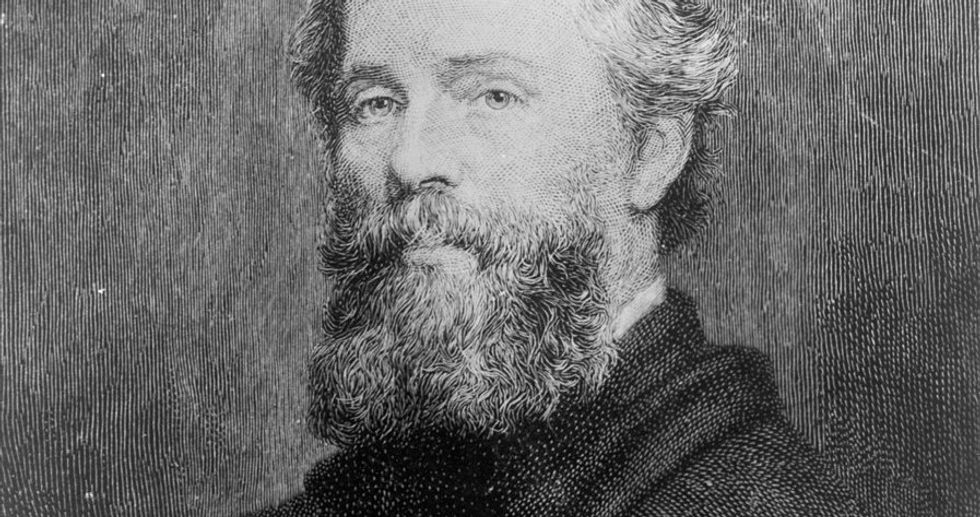Regarded as one of the finest writers to ever come into being by those versed in the lore of American Literature, Herman Melville crashed down upon the beaches of literary endeavour in 1846 with one of his most acclaimed novels "Typee: A Peep at Polynesian Life" -- a fictional, highly romanticized account of the author's voyage to the South Pacific Marquesas Islands. Building off this immediate success, Melville's literary yearnings once again returned to seafaring a decade and a half later with the publishing of his magnum opus "Moby Dick".
Though hailed by scholars and critics as a cultural classic, and a piece deemed far ahead of its time, it was perhaps too far ahead as "Moby Dick" was met with lukewarm reviews, and its commercial failure was such that it was out of print by 1891. Coupled with the failure of his follow-up book "Pierre", Melville became so discouraged he abandoned writing novels for good and returned to composing short stories and poems.
Rediscovered after the first decade of the 20th century, "Moby Dick" has since garnered the distinguished reputation as "The Great American Novel" -- joining the ranks of "The Great Gatsby" and "The Adventures of Huckleberry Finn" -- and has elevated Herman Melville's standing among American Authors as one of the pinnacle figures of American Romanticism -- a veneration he shares with his lifelong friend Nathaniel Hawthorne. Here are five lines delivered by, and proved to be a true force to behold, as the author, and the man that was Herman Melville:
1. "A smile is the chosen vehicle of all ambiguities."
To smile is done more out of a manner than in a moment of unfettered affection.
2. "I know not all that may be coming, but be it what it will, I'll go to it laughing."
The script for the story that if life is that it abides by no script. Their are simply to many spaces for words to reach, and for words to fill. But there in the empty places, places that long to be filled, it never hurts to write in gag. One that fills it with laughs.
3. "It is not down on any map; true places never are."
Where we begin may appear on a map where we can trace our way back should we wander astray, but to arrive at where we seek, that, we must seek ourselves. Even if it takes us far beyond what others have known and sought can contain.
4. "Better to sleep with a sober cannibal than a drunk Christian."
In a world so obsessed with manners, appearance, or anything superficial that is deemed appropriate form, a fresh dose of the truth is always refresh, if not liberating. No matter how ugly it is.
5. "We cannot live only for ourselves. A thousand fibers connect us with our fellow men; and among those fibers, as sympathetic threads, our actions run as causes, and the come back to us as effects."
Whether we act for ourselves, or for the sake of others, actions have consequences. Consequences others may have to bear, even as we may find ourselves reaping consequences born not of actions not our own.
Though Melville has long sailed to what may perhaps be far more blissful shores as we stand upon ones where he once stood, anchored in the heavens and before us, remain his works. Works to bear us hence. To places full of sober cannibals and drunk Christians, places where we may go with much laughter and continue to laugh much long after. Though the laughter may cease at long last, last may our voyage. Whether to more laughter that fades amidst the roar of the sea we know not whence.
- William Barr Reads “Moby-Dick,” Finds No Evidence of Whales | The ... ›
- The 100 best novels: No 17 – Moby-Dick by Herman Melville (1851 ... ›
- What “Moby-Dick” Means to Me | The New Yorker ›
- Screen: John Huston and Melville's White Whale; 'Moby Dick' Opens ... ›
- Why Read Moby-Dick? — By Nathaniel Philbrick — Book Review ... ›
- Novels Are Made of Words: Moby-Dick, Emotion, and Abridgment ›
- Pop-Up Exhibition: Herman Melville's New York, 1850 | New York ... ›
- Herman Melville - The New York Times ›
- PLAQUE HONORS MELVILLE, NEW YORK'S OWN - The New York ... ›
- The Melville Society - Home ›
- Herman Melville's Bartleby and the steely strength of mild rebellion ... ›
- Herman Melville, Master of the Literary Hoax ›
- Did Herman Melville's Mother Make Him Watch Her Sleep? ›

















